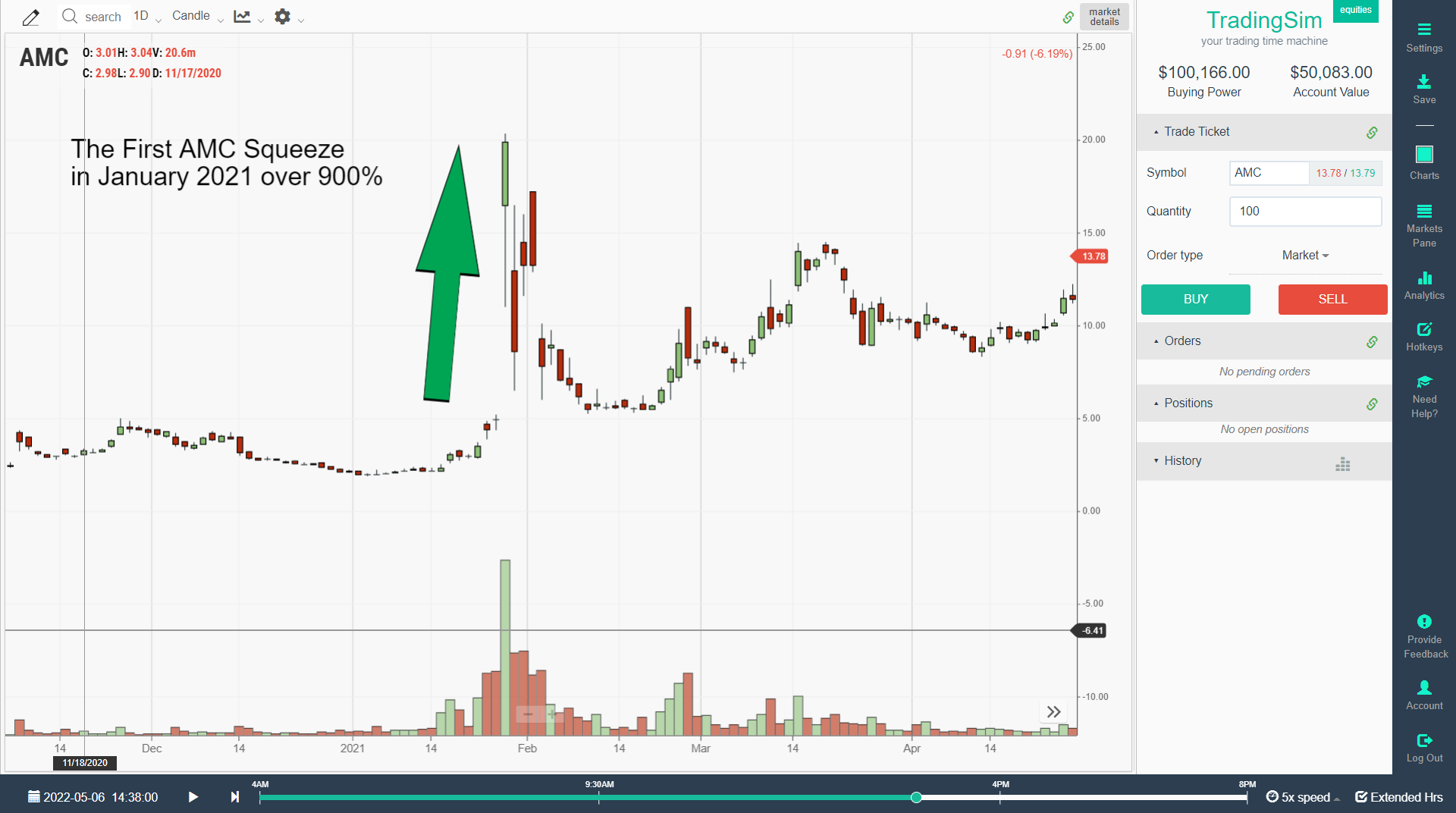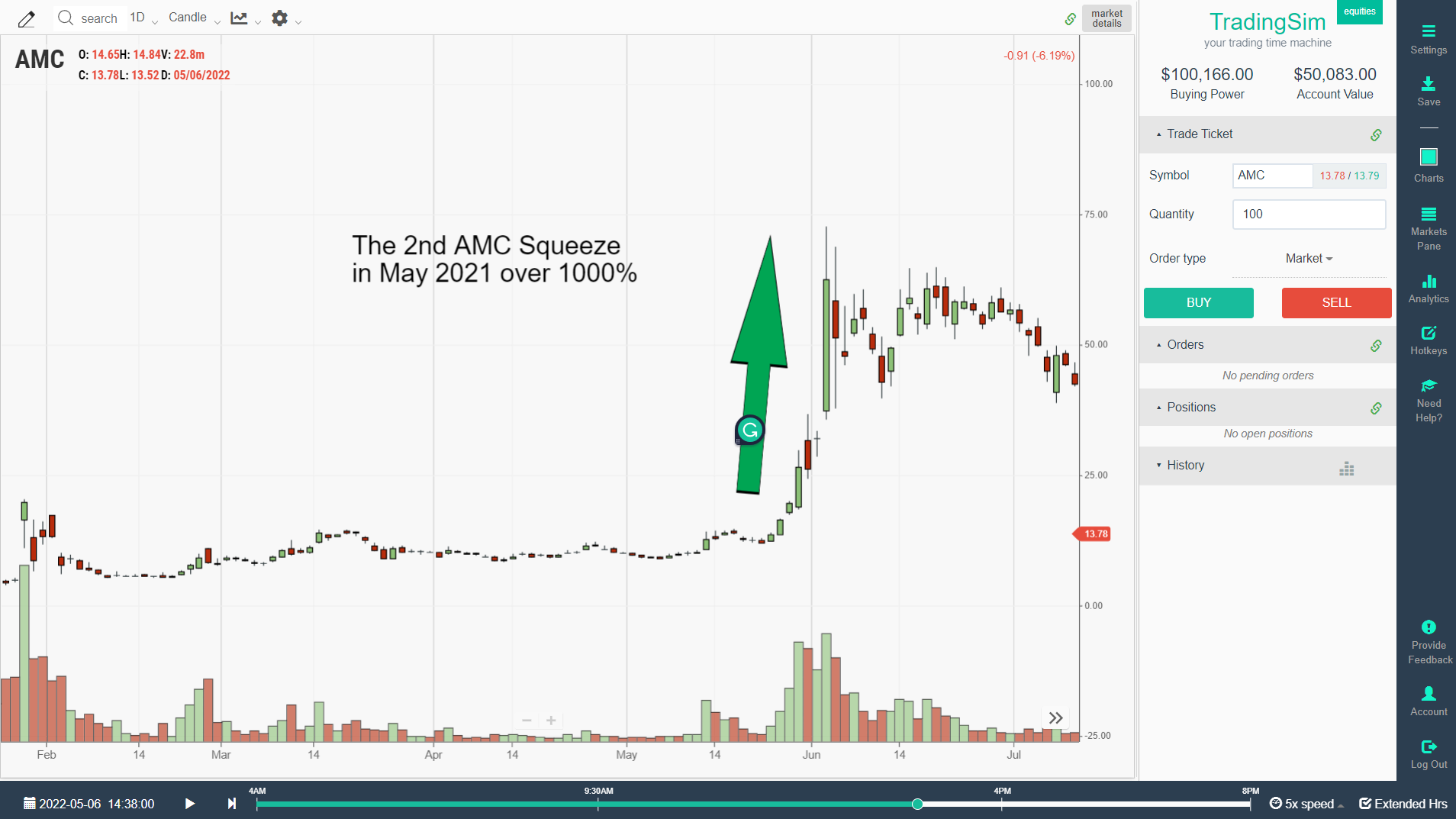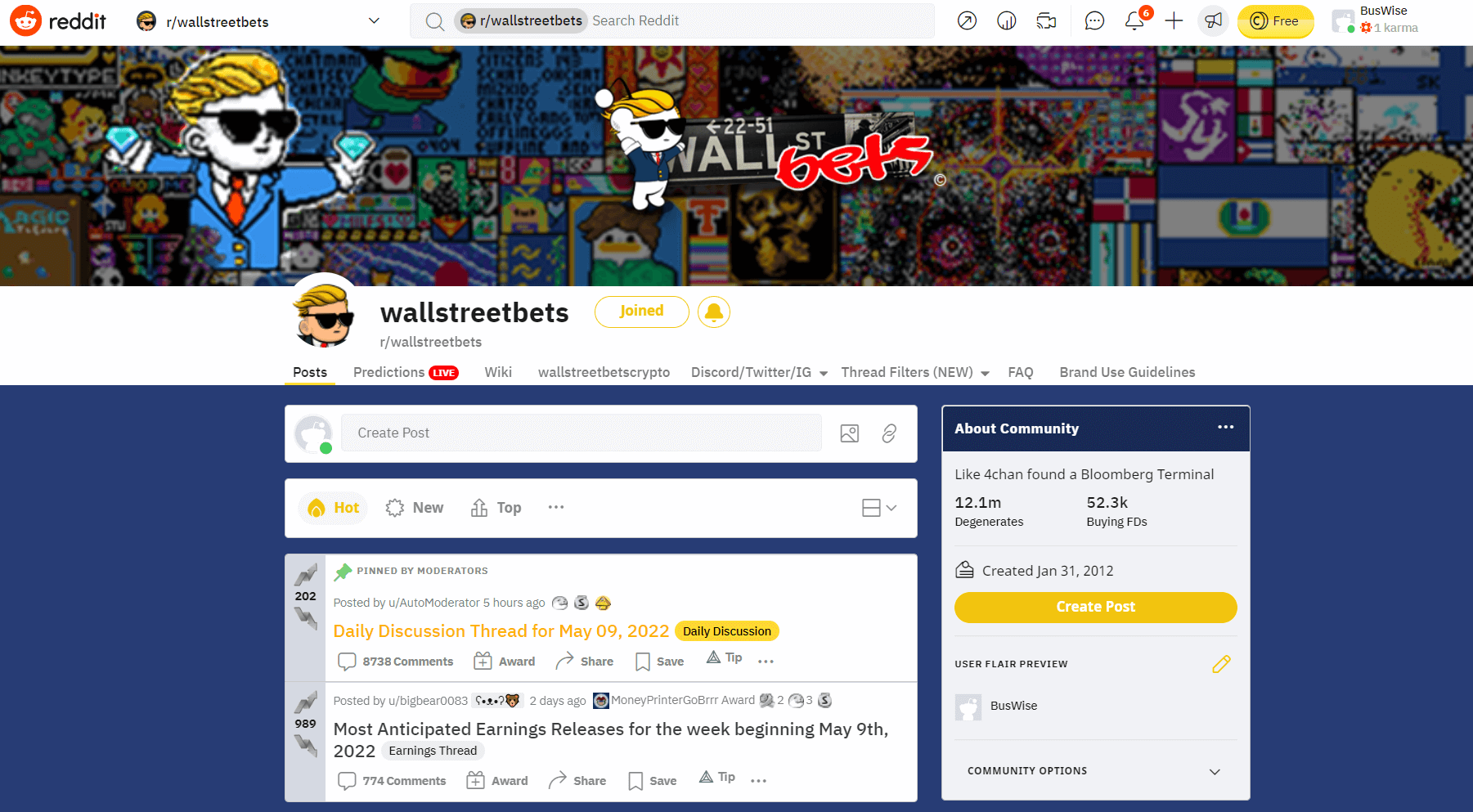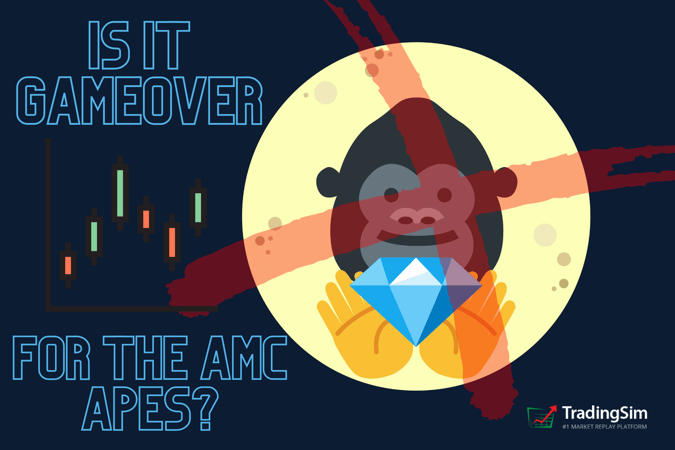What is the AMC squeeze?
The AMC squeeze was a black swan event on the US stock market that initially took place in January of 2021, and culminated in a second squeeze in May. It was a historically unique event that caught Wall Street off guard, and forever cemented the divide between institutional and retail investors. In that amount of time, AMC’s price rose from $1.90 to $72.62.
How did the AMC squeeze happen in 2021?
We all know of AMC the company. It is the world’s largest movie theater chain, although before January of 2021, there probably weren't a lot of us looking to buy shares of it. In fact, we probably didn’t even really notice that due to the COVID-19 pandemic, AMC had found itself on the verge of bankruptcy.

While the public might not have noticed AMC’s current financial situation, hedge funds certainly did. With a failing business and no end in sight to the pandemic, hedge funds took out short positions in AMC’s stock. The act of shorting is when an investor borrows shares and sells them at the current price in anticipation of buying them back at a lower price. This is a one-sided bet on the stock’s price continuing to drop.
But the AMC squeeze would never have been possible without AMC’s main meme stock running mate, GameStop (GME). The retail gaming company started the short squeeze craze amongst retail traders. Arguably, if it weren’t for this initial squeeze event, nobody would have noticed the major short interest in AMC. Once they did, retail traders sent a chilling message to hedge funds by buying up as many of the shares as possible. This led to the first AMC squeeze.
What is a short squeeze?
A short squeeze occurs when short sellers are forced to close their positions at a higher price. Since they have borrowed shares and are waiting to buy them back at a lower price, the short sell trade falls apart if the price of the underlying stock rises. The more shares traders bought the more the hedge funds had to buy back shares at a higher price to close out their short position. Of course, this leads to a massive surge in the stock’s price as the demand for the stock rises above the supply of shares.
On January 27th, 2021, shares of AMC rose by 301.2%.
The second AMC squeeze took place in May under similar circumstances. It appeared that hedge funds did not learn their lesson after January’s squeeze. As the short percentage steadily rose, retail traders were planning their next squeeze. This time, in the eight trading sessions between May 21st and June 2nd, AMC’s share price rose from $12.08 to an all-time high closing price of $62.55.

Both AMC squeezes cost hedge funds billions of dollars, with some shutting down operations and announcing bankruptcy. It was called by many as the greatest victory for retail traders in the history of the stock market. Yet today, less than one year later, the stock is barely trading over its $12.08 per share price from May 21st, 2021.
When will the AMC squeeze happen?
The first two took place in January and May of 2021. Of course, the question everyone asks is when will the next AMC squeeze happen? While retail traders on social media sites like Reddit and Twitter are convinced that we are still awaiting the MOASS or Mother Of All Short Squeezes, others aren’t so sure.
According to Yahoo! Finance, there is currently a 19.3% short percentage against AMC’s stock. Is this enough to produce another short squeeze? Sure, in January of 2021, the short percentage against AMC was around 25%. Nobody knows when or if the next AMC squeeze will happen, but the potential for one could be there.
That being said, we don't believe in hope as a strategy. Usually, a good short squeeze will show signs of development. Wait for the technicals to show up on the chart before you throw your hard-earned money away waiting for a squeeze that may never come again.
How does the AMC squeeze work?
The AMC squeeze was no different than any other short squeeze in terms of the mechanics of the event. One thing that was different was the deliberate nature of the "AMC Apes" to attack the hedge funds that were selling the shares short. It was the first time in history that we saw such a sizeable, coordinated retail movement that directly targeted institutional short sellers, forcing them into closing out their positions.
The process behind a short squeeze is quite simple: the bet against the stock going lower fails. When the stock price rises, short sellers can either hold their position at a loss or close out the position, which means buying back the shares at a higher price and taking a loss on the trade. If the stock price continues to rise, then there is more incentive for short sellers to cut their losses and close their positions. In short selling, losses can become infinite.
With such a rapid escalation of the price due to the large volume of buying, the AMC squeeze triggered what is called a gamma squeeze. Not only were retail traders buying common stock, they were also buying call options. This causes the price of the underlying stock to rise even faster. As more call options and stock were bought, the more the short sellers also had to buy stock to close their short positions. This increase in buying pressure causes the gamma squeeze, which sends the stock price into orbit.
Who shorted AMC?
The unlucky ones who had short positions in AMC were mostly American hedge funds. One of the more well-known hedge funds was Citadel. This hedge fund became public enemy number one during the meme stock rebellion, and Citadel CEO Ken Griffin became the main villain of the saga.
Other hedge funds were involved as well including Melvin Capital, which lost 53% due to its short positions in GameStop and AMC. It was nearly completely liquidated until it received a loan from Citadel and Point72 Asset Management to help it stay in business.
The thing that doesn’t get mentioned often is that these hedge funds were not exactly wrong to have short positions in these meme stocks. AMC was nearing bankruptcy and GameStop was being pushed out of business by digital game downloads. Neither company was or is operating particularly well, so the short positions were actually reasonable trades to make. Unfortunately for those hedge funds, they were just in the wrong trade at the wrong time.
Is the AMC squeeze over?
The AMC squeeze itself ended on June 2, 2021 when the stock hit its all-time high closing price. Since that day it has been all downhill for the stock. Nearly all of the gains made during the squeezes have been erased. So in terms of the most recent AMC squeeze, it is indeed very much over.
But if you ask AMC Apes on Reddit or Twitter, AMC’s stock is as strong as ever. These Apes will tell you that a short squeeze will definitely happen again, and they will point to all kinds of different conspiracy theories as to why it will.
Should you believe them? That’s up to you!
Just know that these traders have been calling for the short squeeze since last June and the stock has steadily fallen ever since. Shares of AMC are down by 48% in 2022 and 70% over the past six months. If there is another squeeze coming, there certainly hasn’t been any sign of it, yet.
Why AMC squeeze won't happen
The short answer to this one is: it just isn’t the market for it. In 2022, the stock market has been mired in an ongoing correction that has hit growth stocks and overvalued companies, like AMC, especially hard. With a rising interest rate environment and US equities at multi-year lows, it just isn’t the time or place for a short squeeze.
Still, we know what you’re thinking: the short percentage is almost 20%, can’t we see another squeeze? The problem here is finding new buyers for the stock. It doesn’t matter how convinced you are of another short squeeze, when the stock falls from $65 to $13 in less than a year, it’s hard to believe in it again. Given how difficult the markets have been to navigate, don’t expect there to be a long line of new Apes trying to buy up shares of a struggling AMC stock.
What will cause AMC to squeeze?
The first thing that might cause AMC to squeeze again is if the markets suddenly turned bullish. If we see a big jump in the stock’s price, we might just be able to get another short squeeze.
Another thing that could spark another squeeze is an influx of new buyers. Chances are the existing Apes might not want to be adding a lot more to what has been a losing investment, unless they were able to get in before January of 2021. If there was enough new buying pressure on the stock, then there is definitely a chance we could see another short squeeze in the future.
Lastly, the free money environment of 2020 and 2021 led to a massive influx of retail traders with cash on their hands. Since then, the economy has been slowing and the helicopter money from the federal government has been put on hold. We imagine that most retail investors are licking their wounds from holding on too long and now they have bills to pay.
How did Reddit affect the AMC squeeze?

Reddit was the platform where all of the short squeeze discussions began. Ever since the folk hero known as Keith Gill, or Roaring Kitty or DeepF*ckingValue, began explaining his GameStop short squeeze hypothesis on r/WallStreetBets, Reddit has been the gathering place for retail meme traders.
It is through Reddit that both AMC short squeezes were coordinated. Even to this day, subreddits like r/WallStreetBets discuss short squeezes and other trading strategies on a daily basis. Effectively, Reddit was the headquarters of the AMC and GameStop short squeeze rebellions.
What are AMC Apes?
AMC Apes are what the retail traders refer to themselves as. They are the ones that caused the coordinated short squeeze on AMC’s stock, and the ones that are also holding the stock for dear life. It’s hard to name a group of investors that is more dedicated to a stock than AMC Apes are.
You can find them on social media channels calling out the corruption and manipulation behind the stock. They are doing their best to continue squeezing the stock.
Why do they call them AMC apes?
So this is an interesting topic that has several different theories as to why the nickname stuck with AMC traders. Some people believe that it is a reference to the Planet of the Apes, which is a popular movie series. In the movies, the Apes overthrow mankind which is sort of a metaphor for upsetting the balance on Wall Street. You can also understand the tie-in with AMC being a movie theater company.
Other people believe that Reddit traders call themselves Apes because it is how hedge funds view retail traders: as dumb apes. The Reddit AMC traders have always welcomed the attitude that hedge fund managers think retail traders are unintelligent, so referring to themselves as apes is likely an allusion to this perceived imbalance.
Whichever theory you prefer, AMC Apes are fiercely loyal to the meme stocks they hold and the companies they invest in. AMC Apes rallied to save AMC from bankruptcy, and have even given the CEO of the company, Adam Aron, the nickname of the Silverback.
How much of AMC is owned by Apes?
This is a number that is likely to change over time. At one point last year, it was 80% of AMC shares that retail traders owned. This year, AMC CEO Adam Aron claims that Apes own over 90% of the shares outstanding. It’s hard to verify this, though, as there are a number of shares owned by ETFs and Mutual Funds as well.
You might also be wondering about the 20% short percentage in AMC. The short interest percentage can be higher than the number of outstanding shares available. Hedge funds can also synthetically short a stock, which means it has short positions and put options on the stock.
So, in the end, it is unclear if Apes own 90% of the company. After all, AMC has over 500 million shares outstanding which would mean that Apes would need to hold about 450 million shares.
What are HODLers?
If you have been in any subreddits about trading or even researched crypto markets, you've undoubtedly come across the term HODL. While it is a cute misspelling of the word "Hold," it is also an acronym that stands for Hold On for Dear Life. The term did originate amongst crypto investors and is a reference to how volatile those markets can be.
What are Diamond Hands?
HODLers is a term that is also used in relation to having diamond hands. What are diamond hands? Why, the opposite of paper hands, of course. These two terms gained popularity during the short squeeze events. Paper hands referred to traders who got scared and sold during the volatility, while diamond hands referred to traders who held strong through all of the ups and downs.
What lessons can be learned from the AMC squeeze of 2021?
There are a lot of lessons that can be learned from either side of the AMC short squeeze. For hedge funds, perhaps shorting a stock that just saw a short squeeze four months earlier isn’t a great strategy. As we said before, nothing was wrong with shorting AMC, the business was in major trouble, and it seemed as good a company as any to short. But the next time social sentiment for a stock hits the fervor pitch of AMC or GameStop, it’s probably best to just cut your losses early and bow out.
For Apes, the lesson is to take your profits. How many HODLers with diamond hands regret not selling the stock when it hit $65 in June? Sure, holding for the long-term and having diamond hands is admirable, but anytime you’re sitting on gains of over 1,000%, you really do need to sell those shares. Take the profits and live to trade another day.
As polarizing as the AMC squeeze was, short squeezes are a normal part of the stock market. Usually, they aren't coordinated, so short sellers do get an opportunity to minimize their losses. No matter what side of the short squeeze event you were on, it’s been less than a year, and the stock is almost exactly where it was trading before the squeeze happened. Nobody knows if another AMC squeeze will happen, but if it does, you can be sure both hedge funds and Apes will be ready the next time.










 Day Trading Basics
Day Trading Basics 
